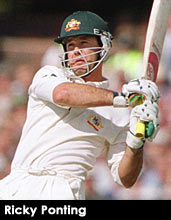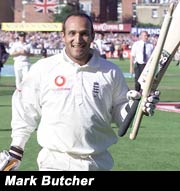Ashes report card
Daniel Laidlaw
The 2001 Ashes series was expected to be competitive but Australia quickly
asserted its superiority and convincingly triumphed 4-1. The following is
a report card on the players who shaped the series...
Australia
Michael Slater, 170 runs at 24.28
The dashing opener's career hit another trough after he was dropped for
the fifth Test following concerns over form and discipline. Along with Justin
Langer, Slater began the tour under pressure to hold his position but
started auspiciously with a scintillating 77 in the first Test that served
notice to England of how they would struggle to contain the Aussie
batting.
Slater never replicated that initial form, with some poor shots leading to
his demise.
Matthew Hayden, 234 runs at 33.42
Frustrating series hampered at various times by indifferent form, bad luck
and injury. Made several starts before receiving a couple of poor
decisions.
Knee trouble would not have helped and by the end of the series was
determined to grind out a big score before holing out. Provided more
stability than Slater but still managed only one half-century.
 Ricky Ponting 338 runs at 42.25
Ricky Ponting 338 runs at 42.25
Ponting's Test career has recently followed a trend: A series of
single-digit scores followed by a big hundred. There was no middle ground
for him in the Ashes. Promoted to No. 3 at start of series, Ponting was
dismissed by a couple of unplayable deliveries and then batted woefully.
Came out of slump with spectacular hundred in fourth Test and finished
series in top form again.
Mark Waugh 430 runs at 86
Also under pre-series scrutiny, Waugh enjoyed his most prolific series for
a long time as part of a rampant middle order. Exhibiting the type of
batting that makes him such an attractive player, Waugh did justice to his form
and made a century at Lord's on his last visit. Farewelled Test cricket in England with a partnership of 197 with brother Steve.
Steve Waugh 321 runs at 107
Never to be underestimated, Waugh made an extraordinary recovery from a torn
calf to be ready, if not fit, for the final Test and proceeded to thump and hobble his way to 157 not out in his last appearance in England. Relished another series against English bowling and continued to win admirers for
his leadership.
Damien Martyn 382 runs at 76.40
Australia's batsman of the series. Awarded a Test place as a regular
rather than a substitute at the start of the series, Martyn was simply sublime.
With the defensive assurance of Steve Waugh and the attacking strokes of
Ponting, Martyn was a picture of fluency and class at No. 6. Made two
hundreds and two fifties in his first full series for 7 years.
Adam Gilchrist 340 runs at 68
Serviceable behind the stumps, Gilchrist's star continued to rise as a
batsman, moving up to sixth on the PwC ratings. Hit a brilliant 152 in the
first Test and remained a destroyer of bowling at No. 7. Also became
fastest 'keeper to 100 dismissals in his 22nd Test. As captain, oversaw
Australia's fourth Test defeat with second innings declaration.
Shane Warne 31 wickets at 18.70
Entered the series with question marks over his effectiveness as a Test
bowler and as a self-proclaimed support bowler to the pacemen.
Emphatically re-asserted himself with a lucrative series against familiar punching bag
England, growing in confidence with every wicket and proving he is still a
Test force. Became sixth bowler to pass 400 wickets and was narrowly
pipped by McGrath as series leading wicket-taker.
Brett Lee 9 wickets at 55.11
Never found full rhythm and pace despite being given every opportunity.
Recovering from elbow surgery, Lee played the entire series and was
Australia's only bowling disappointment. On form would have been replaced
by Fleming or Miller, but Australia wanted to protect its young gun and could
afford to carry him through the tour.
 Jason Gillespie 19 wickets at 34.31
Jason Gillespie 19 wickets at 34.31
Luckless as usual, Gillespie did not reap full reward for his efforts,
especially in the first three Tests. Australia's most consistently fast
bowler, Gillespie moved the ball at pace off the seam and tested most he
bowled to. Strayed by the end of the series but made it through the tour
uninjured.
Glenn McGrath 32 wickets at 16.93
Outstanding again, McGrath's natural movement off the pitch was
exacerbated in seamer-friendly conditions and made him all the more difficult to play.
Bowled consistently well and with typical economy, making him Australia's
bowler of the series. Champion qualities are yet to be fully appreciated.
England
Michael Atherton 221 runs at 22.10
Had a lean series with just two half-centuries and was dismissed by
nemesis McGrath another six times. Despite lack of runs, was involved in several
useful opening partnerships. Finished on a disappointing note when out for
9 in last Test innings, but remained a prized top order wicket in what was
his last series.
Marcus Trescothick 321 runs at 32.10
Compact and positive, Trescothick made several impressive half-centuries
but never capitalised on his starts. Facing McGrath and Gillespie on seaming
pitches could have been much worse and he out-performed his more experienced
opening partner. Demonstrated a willingness to take on the bowling.
 Mark Butcher 456 runs at 50.66
Mark Butcher 456 runs at 50.66
England's revelation of the series. Would not have been picked were it not
for injuries; prior to his century Butcher still impressed with his
technique and composure at the crease, let down only by lapses in
temperament. Overcame that with a match-winning innings in the fourth
Test, England's clear highlight of the series. Even for a player who may not be
the most talented, Butcher proved what can be achieved with application
and the right attitude.
Nasser Hussain 177 runs at 35.40
England captain retained humour in defeat. Had a finger broken by
Gillespie in first Test and forced to look on as Ashes were swept away in the next
two. Returned in form to lead England to a shock win in fourth Test and
was inclined to take the initiative against Warne.
Mark Ramprakash 318 runs at 39.75
Introduced as a replacement in the second Test, Ramprakash showed enough
commitment to hold his place before turning an indifferent series into a
solid one with a resolute century in the fifth Test, his first in England.
Received furious criticism for his reckless stumping in the third Test but
had the confidence to declare he would continue to bat positively.
Usman Afzaal 83 runs at 16.60
Played the first, fourth and fifth Tests and will likely lose his place
once Thorpe and Vaughan return. Aggressive but injudicious, Afzaal's shot
selection let him down a couple of times as he was caught in the slips
driving. Celebrated his half-century in fifth Test ebulliently.
Alec Stewart 283 runs 35.37
Detests batting down the order but ironically made his most runs this
series at No. 7. Forced to bat with the tail, Stewart did so inventively and had
most success when counter-attacking forcefully. Had century partnership
for last wicket in first Test and aggressive 76 not in fourth Test was
particularly memorable.
Darren Gough 17 wickets 38.64
Very disappointing series by England's main striker. With Andy Caddick,
Gough had to take responsibility for taking early wickets and defending
low totals but lacked energy and penetration and was frequently expensive.
Conceded more than 100 runs in an innings in four of five Tests and failed
to rise to the challenge of playing Australia at home he should have
relished.
Andrew Caddick 15 wickets at 49.86
Worse than Gough, Caddick's height and bounce could have been a threat on
the seaming pitches but he wasted this natural asset by often bowling too
short and was consequently hammered. Lacked the patience to build up
pressure by bowling a good length and consistently conceded four runs per
over. England needed better from its opening bowler.
Alex Tudor 7 wickets at 27.85
No third bowler played more than three Tests because of injury and form
and though Tudor was only involved in two, was the most impressive of
England's motley support crew. It is not a coincidence that on Tudor's return to the
side in the third Test Australia was bowled out for 190, easily its lowest
total. But after that five-wicket haul Tudor also disappointed, unable to
produce the same pace and accuracy.
More Columns
Mail Daniel Laidlaw